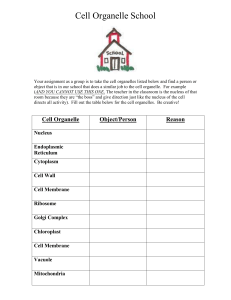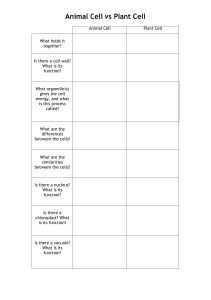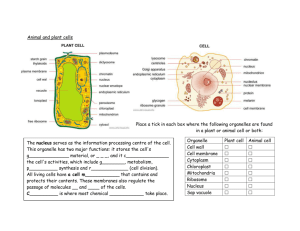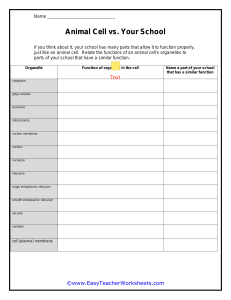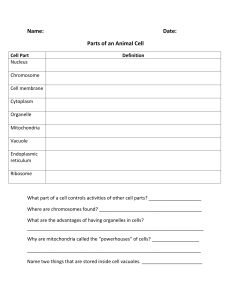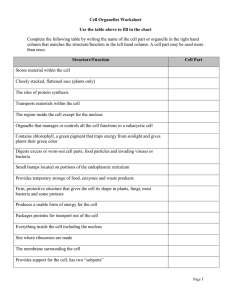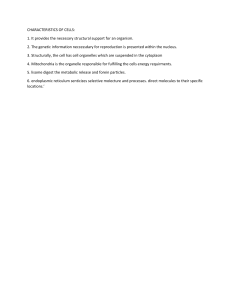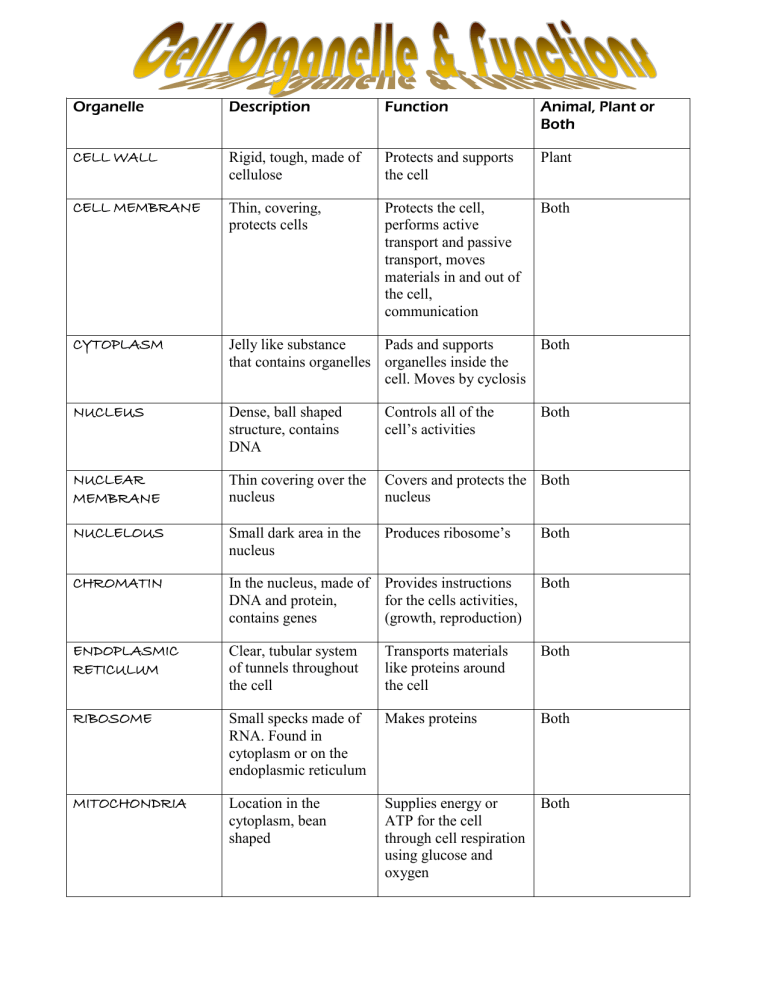
Organelle Description Function Animal, Plant or Both CELL WALL Rigid, tough, made of cellulose Protects and supports the cell Plant CELL MEMBRANE Thin, covering, protects cells Protects the cell, performs active transport and passive transport, moves materials in and out of the cell, communication Both CYTOPLASM Jelly like substance Pads and supports Both that contains organelles organelles inside the cell. Moves by cyclosis NUCLEUS Dense, ball shaped structure, contains DNA Controls all of the cell’s activities NUCLEAR MEMBRANE Thin covering over the nucleus Covers and protects the Both nucleus NUCLELOUS Small dark area in the nucleus Produces ribosome’s Both CHROMATIN In the nucleus, made of DNA and protein, contains genes Provides instructions for the cells activities, (growth, reproduction) Both ENDOPLASMIC RETICULUM Clear, tubular system of tunnels throughout the cell Transports materials like proteins around the cell Both RIBOSOME Small specks made of RNA. Found in cytoplasm or on the endoplasmic reticulum Makes proteins Both MITOCHONDRIA Location in the cytoplasm, bean shaped Supplies energy or ATP for the cell through cell respiration using glucose and oxygen Both Both VACUOLE Large open storage area, smaller in animal cells Storage tank for food, water, wastes or enzymes Both CHLOROPLAST Green structures that contain chlorophyll Captures sunlight and uses it to produce food through photosynthesis Plant GOLGI BODY Small bags with tubes connecting them Packages and secrets proteins for use in and out of the cell Both LYOSOME Small, round structures, containing enzymes Digests older cell parts, Both food or other objects CENTRIOLE Small cylindrical Used with the spindle apparatus during mitosis Animal Page 2 Use the given cell organelle handout to fill in the chart Complete the following table by writing the name of the cell organelle in the right hand column, matching the structure/function in the left hand column. A cell part may be used more than once. Structure/Function Cell Part Stores material within the cell Closely stacked, flattened sacs (plants only) The sites of protein synthesis Transports materials within the cell The region inside the cell except for the nucleus Organelle that manages or controls all the cell functions in a eukaryotic cell Contains chlorophyll, a green pigment that traps energy from sunlight and gives plants their green color Digests excess or worn-out cell parts, food particles and invading viruses or bacteria Small bumps located on portions of the endoplasmic reticulum Provides temporary storage of food, enzymes and waste products Firm, protective structure that gives the cell its shape in plants, fungi, most bacteria and some protests Produces a usable form of energy for the cell Packages proteins for transport out of the cell Everything inside the cell including the nucleus Site where ribosomes are made The membrane surrounding the cell Provides support for the cell, has two “subparts” Page 3 Name for the collection of DNA in the nucleus of eukaryotic cells Consist of hollow tubes which provide support for the cell Small hair-like structures used for movement or sensing things Composed of a phospholipid bilayer Longer whip-like structures used for movement Put a check in the appropriate column(s) to indicate whether the following organelles are found in plant cells, animal cells or both. Organelle Plant Cells Animal Cells Organelle Cell Wall Lysosome Vesicle Mitochondria Chloroplast Nucleolus Chromatin Nucleus Cytoplasm Plasma membrane Cytoskeleton Central vacuole Endoplasmic reticulum Ribosome Golgi apparatus Vacuole Plant Cells Animal Cells Page 4
